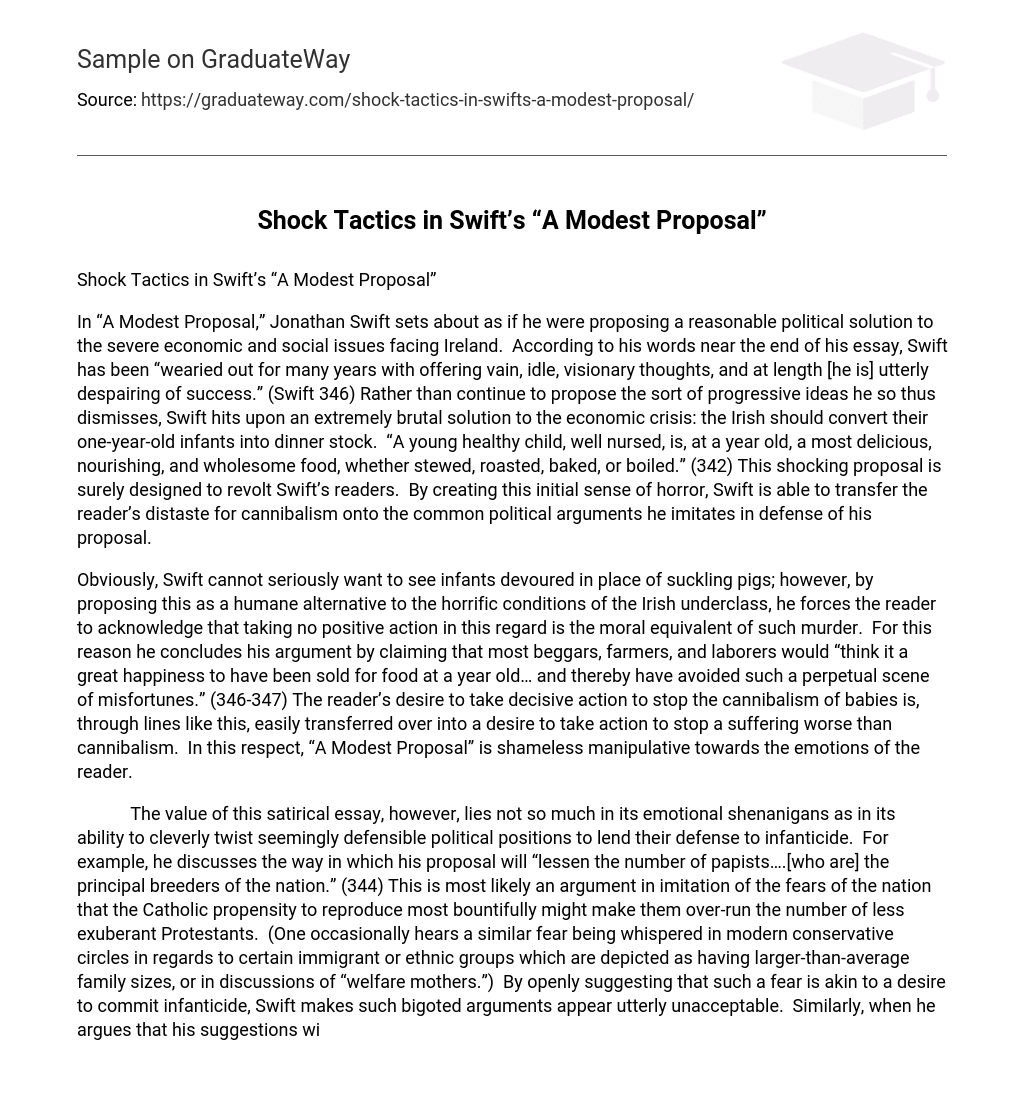In “A Modest Proposal,” Jonathan Swift sets about as if he were proposing a reasonable political solution to the severe economic and social issues facing Ireland. According to his words near the end of his essay, Swift has been “wearied out for many years with offering vain, idle, visionary thoughts, and at length [he is] utterly despairing of success.” (Swift 346) Rather than continue to propose the sort of progressive ideas he so thus dismisses, Swift hits upon an extremely brutal solution to the economic crisis: the Irish should convert their one-year-old infants into dinner stock. “A young healthy child, well nursed, is, at a year old, a most delicious, nourishing, and wholesome food, whether stewed, roasted, baked, or boiled.” (342) This shocking proposal is surely designed to revolt Swift’s readers. By creating this initial sense of horror, Swift is able to transfer the reader’s distaste for cannibalism onto the common political arguments he imitates in defense of his proposal.
Obviously, Swift cannot seriously want to see infants devoured in place of suckling pigs; however, by proposing this as a humane alternative to the horrific conditions of the Irish underclass, he forces the reader to acknowledge that taking no positive action in this regard is the moral equivalent of such murder. For this reason he concludes his argument by claiming that most beggars, farmers, and laborers would “think it a great happiness to have been sold for food at a year old… and thereby have avoided such a perpetual scene of misfortunes.” (346-347) The reader’s desire to take decisive action to stop the cannibalism of babies is, through lines like this, easily transferred over into a desire to take action to stop a suffering worse than cannibalism. In this respect, “A Modest Proposal” is shameless manipulative towards the emotions of the reader.
The value of this satirical essay, however, lies not so much in its emotional shenanigans as in its ability to cleverly twist seemingly defensible political positions to lend their defense to infanticide. For example, he discusses the way in which his proposal will “lessen the number of papists….[who are] the principal breeders of the nation.” (344) This is most likely an argument in imitation of the fears of the nation that the Catholic propensity to reproduce most bountifully might make them over-run the number of less exuberant Protestants. (One occasionally hears a similar fear being whispered in modern conservative circles in regards to certain immigrant or ethnic groups which are depicted as having larger-than-average family sizes, or in discussions of “welfare mothers.”) By openly suggesting that such a fear is akin to a desire to commit infanticide, Swift makes such bigoted arguments appear utterly unacceptable. Similarly, when he argues that his suggestions will “be a great enducement to marriage,” (345) he appears to be arguing like a social conservative, suggesting that the problems with society originate in the loose morals of the poor, and that public policy should make public morality one of its cornerstones. Again, by turning such an argument into a defense of cannibalism, Swift effectively criticizes practice of considering moral rectitude to be more important than the social and physical welfare of children.
In addition to grabbing the reader’s emotional attention and discrediting his opponent’s arguments, Swift also manages to urge his own arguments into the light. Precisely by using the shocking tactic of roundly dismissing economic alternatives, Swift forces the reader to carefully consider those arguments in hopes that one of them might in fact be a substitute for cannibalism. In the same way that having his pro-cannibalism persona use a political argument serves to discredit that argument, having that persona dismiss an argument serves to bolster its credibility. Thus when he speaks against “using neither clothes nor household-furniture except what is of our own growth and manufacture…quitting our animosities and factions…” (346), these ideas seem increasingly plausible. This effect is heightened when Swift’s persona admits that the only reason to prefer cannibalism over such solutions is simply that there will never be “sincere attempts to put them into play.” (346) Again the reader is emotionally engaged: is it really easier to imagine people willing to give up their babies to slaughter than it is to imagine them willing to give up their foreign exports and their partisanship? If the answer is no, Swift implies, then why not work to improve situations in that fashion, rather than letting children and families suffer the “greater miseries” (347) that are so much worse than cannibalism.
Swift’s essay is an unabashed attempt to persuade through mockery and emotional blackmail. He counts on the reader’s gut-wrenching reaction to urge them to action, then associates all the arguments he disagrees with into his defense of the indefensible, leaving the reader no reasonable course of action other than to agree with the things that he sets up as the only alternative: those very ideas that he professes himself to be weary of defending. To say that he encourages critical reconsidering of political stances and motivations may be a bit generous — like much political satire, his work is very heavy-handed in its polemics. Certainly, however, he provides a unique perspective on both politics and the motivations behind them, and in so doing provides fodder not only for the politics of his own era but also for the arguments of future generations.
Works Cited
Swift, Jonathan. “A Modest Proposal.” The Norton Anthology of Western Literature, 8th Edition, Volume 2. Ed. Sarah Lawall. New York: W.W. Norton & Company, 2006. 341-347.





